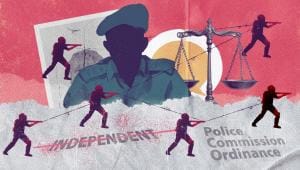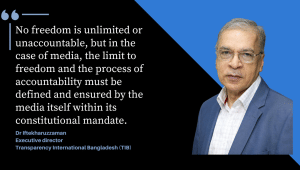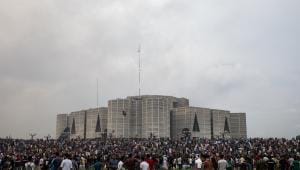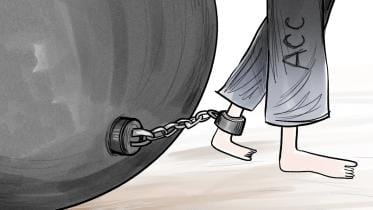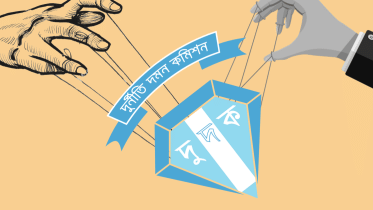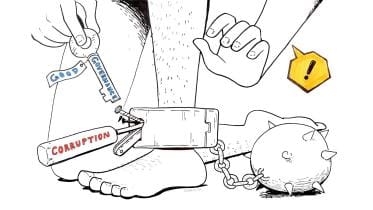The police commission ordinance is an eyewash at best
The longstanding public demand and decades of relentless advocacy by stakeholders, particularly articulated as a key aspiration of the July movement, for an independent police commission, have been ruthlessly and shamelessly shattered by the Police Commission Ordinance 2025, gazetted on December 09, 2025.
14 December 2025, 03:00 AM
Can we break the triad of corruption, rights abuse, and injustice?
Every year, the International Anti-Corruption Day is observed on December 9, shortly followed by the International Human Rights Day.
9 December 2025, 02:00 AM
Can we rise back up from the abyss of corruption?
The recommendations of the Anti-Corruption Reform Commission must be implemented with a specific focus on the ACC’s true independence and accountability.
12 February 2025, 02:00 AM
Why bringing the laundered money back may not be easy
Dirty money is conveniently welcomed in host economies, becoming clean until proven otherwise.
9 December 2024, 03:00 AM
External forces must not interfere with the media
Dr Iftekharuzzaman, executive director of Transparency International Bangladesh (TIB), speaks with Naznin Tithi of The Daily Star.
12 November 2024, 02:00 AM
Does the crushing fall of Awami League augur true victory of the people?
Whether the fall of Sheikh Hasina’s regime will eventually lead to a sufficiently robust democratic transition remains to be seen.
6 August 2024, 15:00 PM
Move away from blame game and confrontational power politics
The Appellate Division verdict of July 21 has opened the scope for resolution of the main issue around the demands coming from the quota reform movement.
22 July 2024, 18:00 PM
Costs of high-level corruption: Further down the kleptocratic route
Collusive abuse of power is a major reason why perpetrators of high-level corruption can get away scot-free in Bangladesh.
29 June 2024, 02:00 AM
Corruption control: Can the righteous and benevolent exercise of monopolized power help?
Corruption is a global menace that no country has succeeded in bringing down to zero level.
27 February 2024, 18:00 PM
CPI 2023: With the lowest score in 12 years, what’s next for Bangladesh?
If Bangladesh is to succeed in corruption control, impunity must be challenged, and the powerful in particular must be brought to justice.
30 January 2024, 18:00 PM
Corruption, zero-sum politics and democratic decline
Governments that score low in corruption indexes are more prone to use force and violence to control and suppress dissensions and protests.
9 December 2023, 04:00 AM
Election Commission's burden of a looming non-inclusive election
Has the EC played its due role? Or have its actions—or rather inactions—contributed to the current political crisis?
12 November 2023, 02:00 AM
Can a defaulter prevail over the government?
Why has no investigation taken place to explore on which grounds and for whose benefit the lion’s share of the climate fund was deposited in the Farmers Bank?
8 October 2023, 02:00 AM
Income Tax Act 2023: Yet another mortal blow to ACC
This is not the first time that the ACC’s authority in the key areas of its mandate have been tactfully curtailed.
27 June 2023, 17:00 PM
Our anti-corruption capacity is hostage to power
Positions of power acquired through various means have long been allowed to be treated as a licence for self-enrichment through various illicit means.
5 March 2023, 17:00 PM
IMF’s conditions on governance and corruption - rhetoric or reality?
The key to the ACC’s effectiveness in delivering its mandate is independence, especially when setting the example that, in handling allegations of corruption, it is guided by equality before law, and not by the status or identity of the individual depending on their political, governmental, or other connections.
18 February 2023, 16:00 PM
CPI 2022: Disappointing global and Bangladesh performances
CPI 2022 shows how corruption, conflict and insecurity are interrelated and feed each other.
1 February 2023, 02:00 AM
Can a bureaucrat-reliant ACC really be independent?
The recent decision to empower the secretary does not bode well for the Anti-Corruption Commission
23 January 2023, 15:58 PM
New decision will diminish ACC's authority
The ACC has delegated the power to its secretaries to decide on the transfer and promotion of its deputy directors and assistant directors.
13 January 2023, 07:57 AM
Another year of missed opportunities against corruption
High-level pledges against corruption continued to be reiterated in 2022, as in the past several years.
29 December 2022, 15:10 PM




